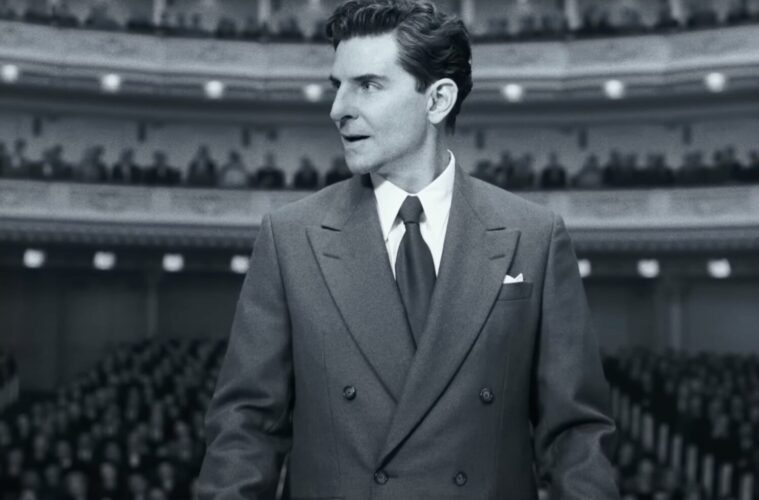 Like its protagonist, the American conductor, composer, and pianist Leonard Bernstein, Maestro can’t decide to be one thing. It’s a snapshot of an artist that doesn’t seem terribly interested in his art, and a love story in which one of the partners suffers at the hands of the other. Bradley Cooper co-wrote the screenplay with Josh Singer, directs, and stars alongside Carey Mulligan, who plays his wife Felicia Montealegre Cohn, a Broadway actress. It premieres on Netflix on the 20th.
Like its protagonist, the American conductor, composer, and pianist Leonard Bernstein, Maestro can’t decide to be one thing. It’s a snapshot of an artist that doesn’t seem terribly interested in his art, and a love story in which one of the partners suffers at the hands of the other. Bradley Cooper co-wrote the screenplay with Josh Singer, directs, and stars alongside Carey Mulligan, who plays his wife Felicia Montealegre Cohn, a Broadway actress. It premieres on Netflix on the 20th.
Bernstein made his sensational conducting debut for the New York Philharmonic in 1943, an event which shot him into the public eye and launched a career that included major works in ballet, opera, film scoring, and musical theater. In the early scenes shot in silvery black-and-white, Cooper captures the excitement of the New York bohemian scene with verve, executing some vertiginous, digitally enhanced long takes to communicate the character’s self-discovery. By the time Felicia arrives, the backdrop to a romance for the ages has been thoroughly established.
But Bernstein’s romance extends beyond mere marital love. Cooper does not shy away from depicting Bernstein’s sexual relationships with other men—including clarinetist David Oppenheim (Matt Bomer)—presenting these affairs as a test to his marriage. Mulligan touchingly moves through the stages of worry, anger, and fear as Felicia watches her husband descend into alcohol and drug abuse before she herself succumbs to breast cancer. Their story is less a grand passion of mythic dimensions than a cycle of abuse, forgiveness, and acceptance. We are told to believe that Bernstein’s voracious love of life led him in many directions at once, up blissful staircases of passion and down dark alleys of addiction, but for all of its overtures the film can’t quite penetrate the skin of its main subject.
Cooper, equipped with a prosthetic schnoz and some of the most convincing aging makeup of the last few decades, indulges himself at every possible turn, delivering a performance that screams Oscar bait. He even allows himself one bravura, sweaty long take—during the performance of Mahler’s Resurrection Symphony at Ely Cathedral—to show how much he’s done his homework, and his gestures are indeed beautiful. When he acquires a shock of white hair and a stuffy nose in the later portions of the film, he somehow manages to keep the suggestion of youthful exuberance. But it’s Mulligan—a perfectly calibrated impersonation of the longsuffering wife of a self-destructive celebrity—whose understatement wins the day.
Maestro spent almost five years in development before reaching the screen. Both Martin Scorsese and Steven Spielberg were attached at different points to direct. (They are credited as producers.) Though never anything less than ambitious, this is a film in which the parts are greater than the whole, and viewers are apt to feel a little melancholy when they see footage of the real Bernstein, eyes closed in rapturous attention, playing before the closing credits. There is much more to the man than we see on screen.
Advertising disclosure: We may receive compensation for some of the links in our stories. Thank you for supporting LA Weekly and our advertisers.

